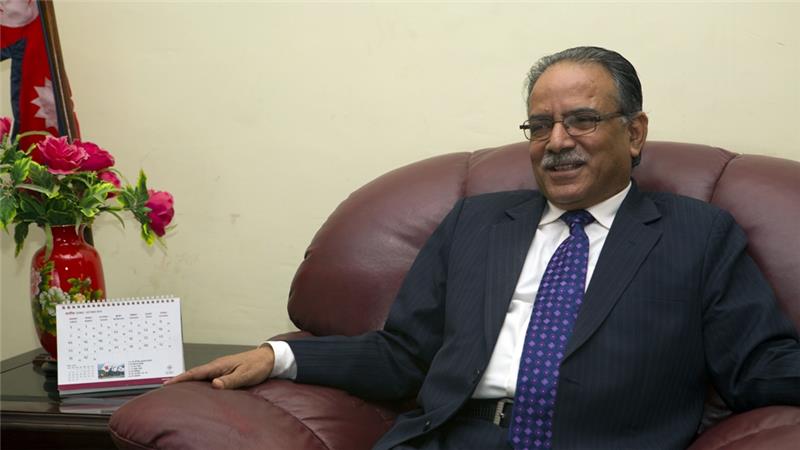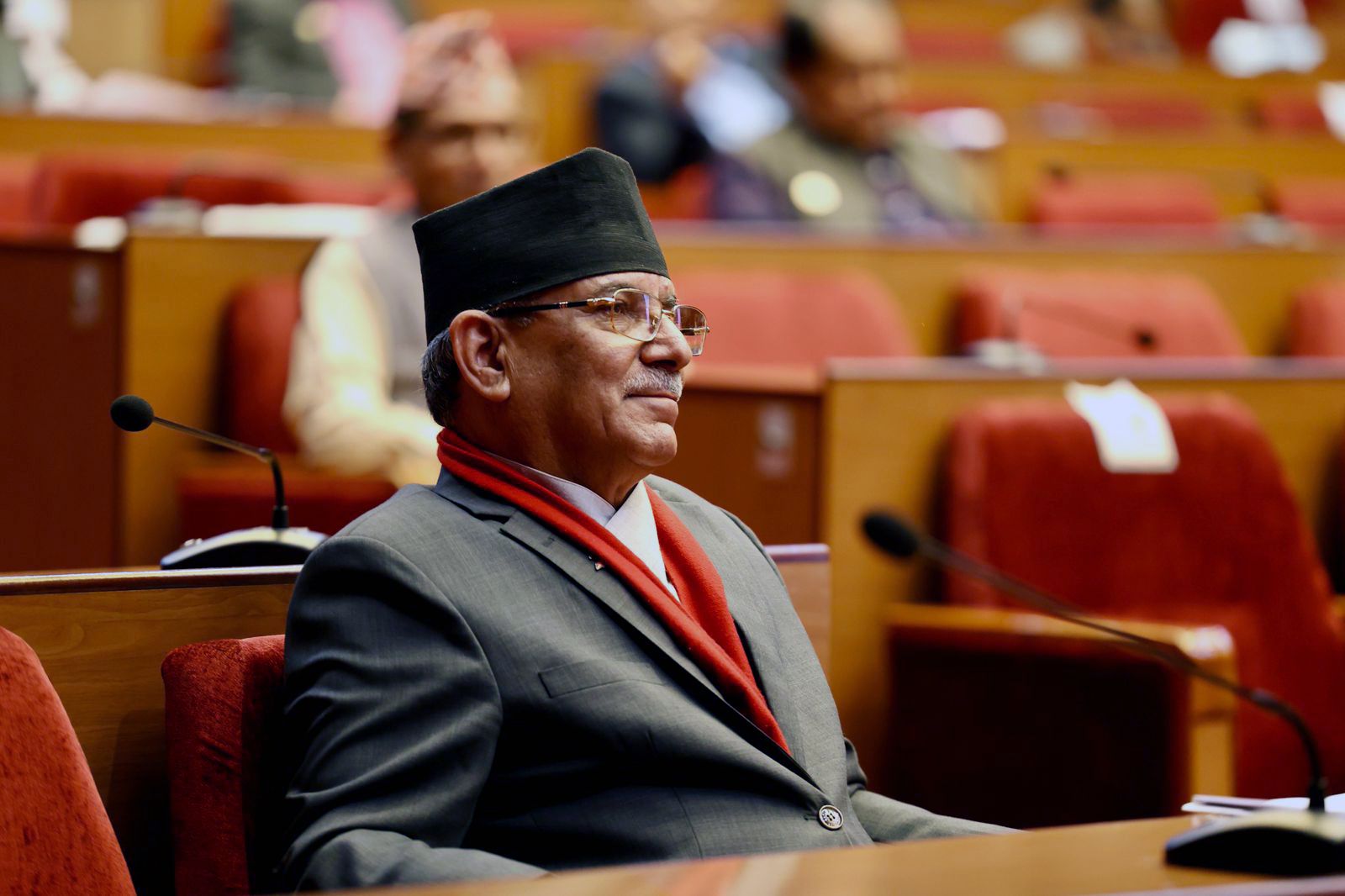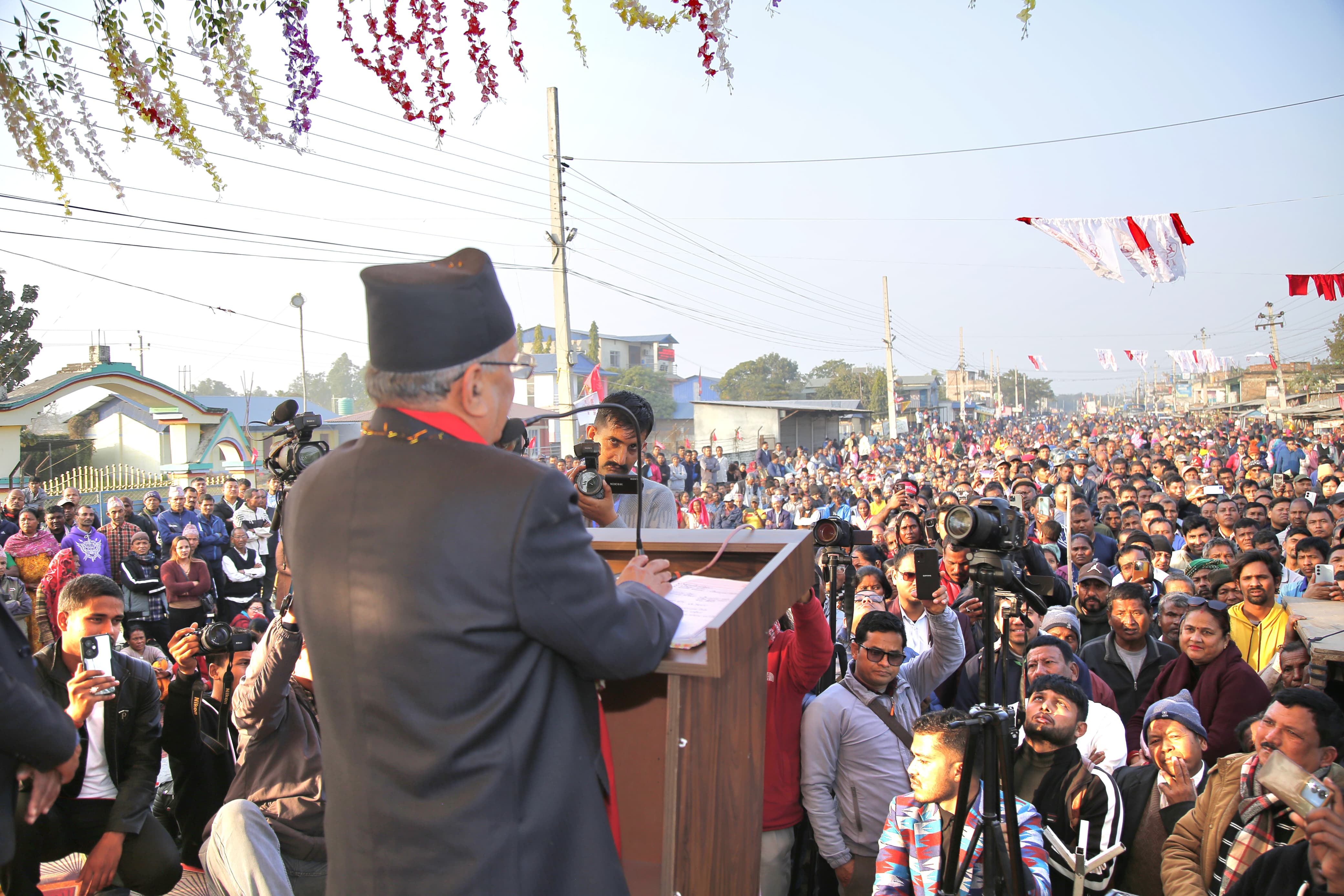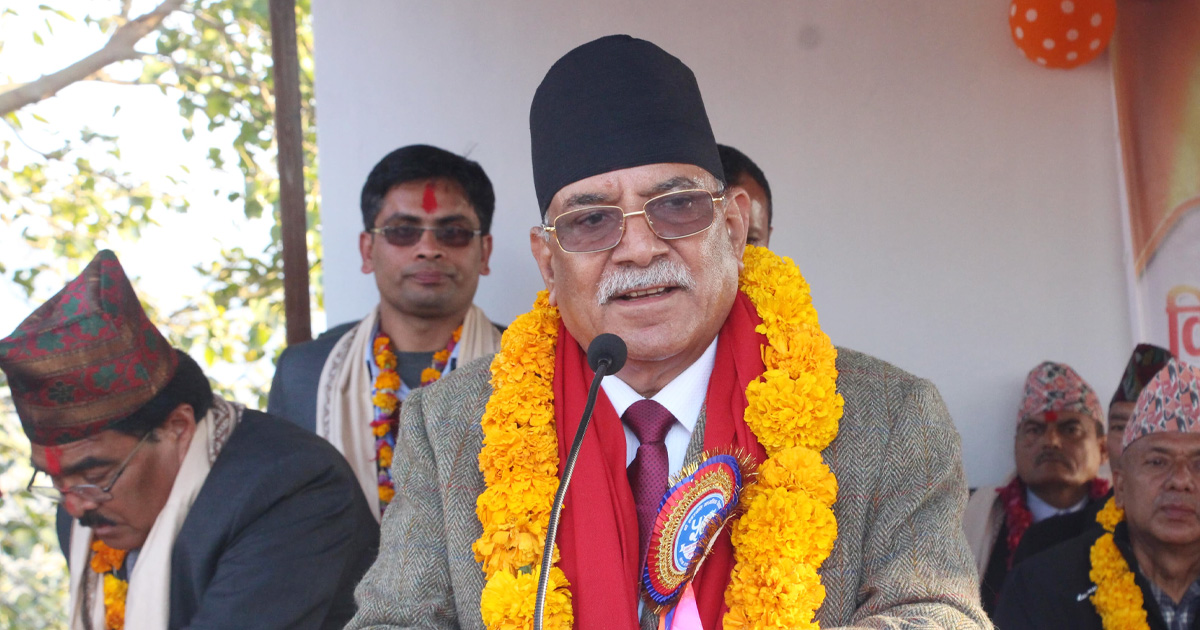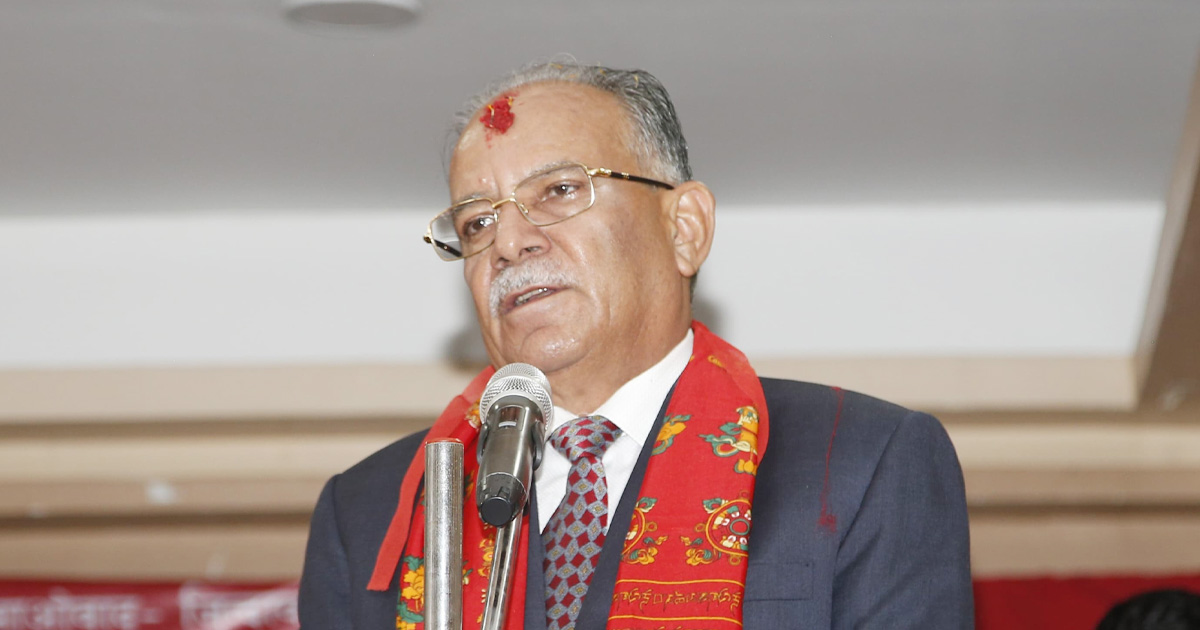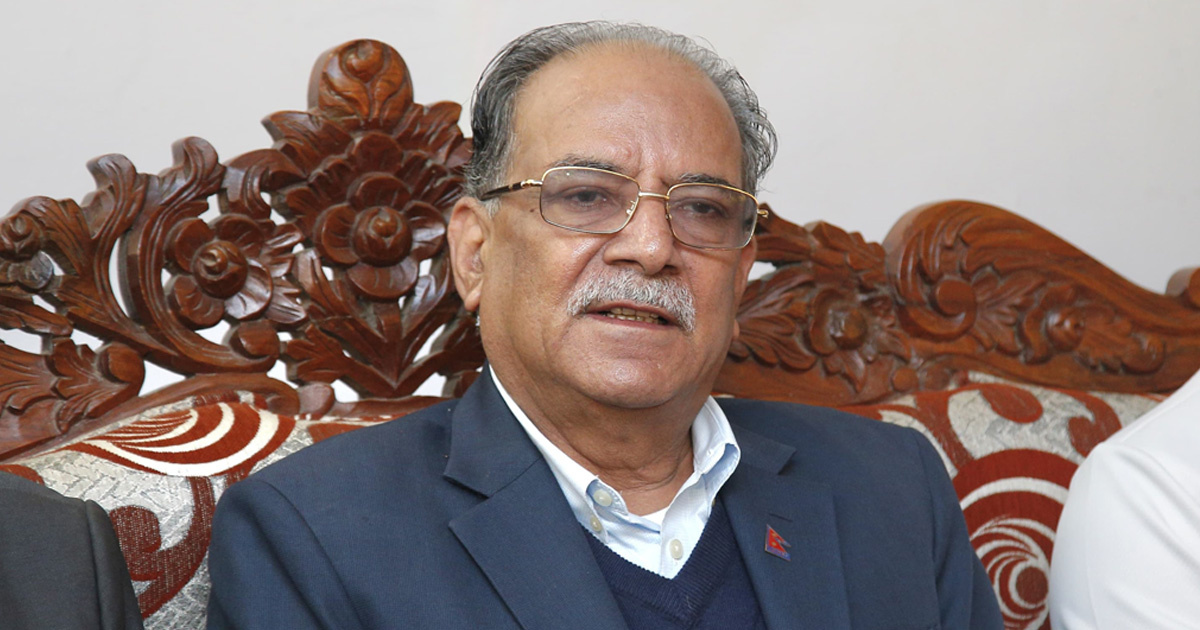Maoist leader talks to Al Jazeera about the issues Nepal faces, after devastating earthquake and political tensions.
Kathmandu, Nepal: Nepal completed its democratic transition last September, when it passed its long delayed constitution.
The Himalayan nation has entered a new era of politics 20 years after Maoist fighters launched an armed rebellion that finally resulted in the removal of 240-year-old monarchy in 2008.
The South Asian nation of 28 million people has just come out of political and economic crisis after five months of anti-constitution protests by Madhesi parties, who want more economic and political rights.
The Maoist party was credited with the biggest political change, but they have been accused of compromising their core ideologies after coming to power.
Al Jazeera sat with Maoist party chief Pushpa Kamal Dahal or “Prachanda” – the second most powerful politician after Prime Minister Khadga Prasad Sharma Oli – at his home in Kathmandu to hear his views on a range of issues facing Nepal.
Al Jazeera: You have said that the new constitution has empowered the minority and marginalised. But why are groups such as Tharus and Madhesis protesting against it?
Prachanda: The issue of the constitution is republicanism, federalism and secularism and inclusive representation of the marginalised people.
All these major issues have been addressed in the new constitution. The new constitution is progressive in terms of the empowerment of marginalised people.
However, the Tharu and Madhesi people are unhappy with the delineation of provinces. They agree on key issues of proportional inclusion, republicanism, secularism, and federalism.
I am hopeful that within a framework of this constitution the remaining issues can be solved through an amendment to the constitution. In fact, the process of amendment has already been initiated.
Al Jazeera: The Prime Minister KP Sharma Oli-led government (of which you are a part) finally passed the amendments. Why did it take so long?
Prachanda: It is unfortunate that it took five months for the first amendments to be passed. It took so long because we tried our best to convince the Madhesi parties that they should own this amendment. Unfortunately, we could not succeed in convincing them.
Al Jazeera: Do you think the nationalist rhetoric espoused in recent months has made hill people suspect the Madhesis even more?
Prachanda: There is a huge communication gap between the two communities. We need to interact more with the Madhesi parties and community.
There is plenty of confusion among the masses of people in Madhes, and we are trying our best to communicate what exactly we have achieved through this new constitution and its shortcomings.
If everything is clearly explained, then the people will become convinced that the new constitution is more progressive than the previous one.
Al Jazeera: What’s your take on the future of India-Nepal relations?
Prachanda: Prime Minister KP Sharma Oli’s visit is a goodwill visit. It will create a positive atmosphere for the normalcy of the relationship and to move forward.
The situation has already become better since there is no blockade in border areas, the Madhes agitation has been addressed to some extent, and [the] other issue of delineation is being looked into. The trust deficit is there but the visit will create an atmosphere of trust between the two governments.
Al Jazeera: What will be Nepal’s foreign policy vis-à-vis India and China?
Prachanda: We want to keep equidistance between them. Our religion, history, culture, geography clearly dictate us to have a unique relationship with India. With China we don’t have an open border, and the religious and cultural ties aren’t there.
Al Jazeera: What do you think the Maoist movement achieved and what remains to be achieved?
Prachanda: Many changes have been institutionalised in the new constitution. These are the achievements of the Maoist People’s War and Maoist movement.
Without that we can clearly state that there could not have been any republicanism, federalism, secularism, and inclusive democracy.
Thirty-three percent women representation in parliament and all other special rights are clearly mentioned in the new constitution. But the People’s War was initiated to establish a new democratic state and go directly into socialism. We could not achieve our goals.
The new democratic revolution was meant to smash feudalism and imperialism, but we could not completely smash feudalism. But we smashed a 240-year-old autocratic monarchy.
Al Jazeera: What led to splits in the Maoist party? There is talk of unity now. What is bringing them together?
Prachanda: The division among the Maoist party has created a difficult situation for the left movement in particular and the overall political changes taking place in Nepal in general.
Therefore, people have raised voices in favour of the unity among the Maoists. I am trying to lead the process of reunification and move forward in peaceful democratic elections, and through this process create an atmosphere for socialist revolution.
The sacrifices made by former PLA fighters made possible the change in Nepal’s political landscape. But they seem to have been left out in the cold. Has the party failed to help them get on with life?
All cadres, either from the PLA or rank and file of the party, understand the power balance at the international, national, and regional level. They understand the compromise we made was forced by the situation.
If we had not compromised, signed the Comprehensive Peace Agreement, and entered electoral politics, the communist movement could have been sabotaged, or it could have ended very badly.
Al Jazeera: But has the Maoist party taken initiative for the livelihood of former PLA fighters and the education of their children?
Prachanda: In our last Central Committee meeting we focused our attention to address them. In the new recruitment process, they will be given priority. Meanwhile, the party has also decided to start a fund for those who were injured during the People’s War.
Al Jazeera: The Maoist party is in power with the extreme right-wing party – Rashtriya Prajatantra Party – that wants to bring back the monarchy. How do you reconcile with this?
Prachanda: The new government is mainly based on the idea of republicanism and the new constitution. It is on this basis that the current alliance has been created. It’s not a question of rightist or leftist, it’s unity in action for the time being.
Al Jazeera: Now that formalities of the democratic transition are over, when do we expect general elections?
Prachanda: According to the new constitution we should organise new elections in two years. And before the federal elections, there will be local elections.
Al Jazeera: Moving forward, what do you think is Nepal’s biggest challenge?
Prachanda: Right now the biggest challenge is economic development. Without initiating a process of economic development, we cannot have sustainable peace. Right now, the implementation of the constitution and initiating the process of economic development are the two biggest challenges we face.
Al Jazeera: It’s almost 10 months since the devastating quake hit Nepal, but many people we met in Kathmandu say they have yet to receive any help from the government. Victims say no officials visited them.
Prachanda: There may be some households who might not have got help from the government. But it’s not true that nobody [politicians and bureaucrats] has gone there. I myself have visited many areas, including Bhaktapur.
A mechanism has been created for reconstruction. I am hopeful the situation will improve soon.
Source: Al Jazeera
 क. प्रचण्ड
क. प्रचण्ड
